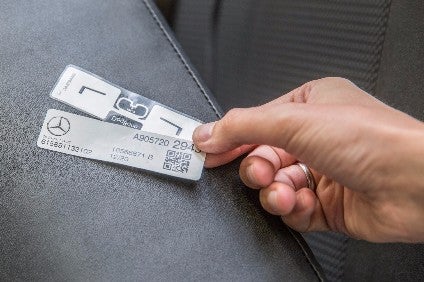
Ahead of the start of production of the redesigned Sprinter van, Mercedes-Benz Vans is bringing new connected series production technology online for greater flexibility and efficiency at the main plant in Ludwigsfelde near Berlin.
Employees benefit from the increasing digitisation in production by being relieved of routine tasks, the automaker said.

Discover B2B Marketing That Performs
Combine business intelligence and editorial excellence to reach engaged professionals across 36 leading media platforms.
Between 2017 and 2025, the unit will spend EUR200m expanding intelligent production.
Operations head Frank Klein said: “We want to realise potentials throughout the entire production process with new technologies such as RFID. Our production operations around the world are to be fully digitised by 2025.”
In a pilot phase, RFID technology (radio-frequency identification) is used to track and identify door mirrors and seats automatically and contactlessly via radio waves. This happens from the moment they are received to the time the complete vehicle comes off the assembly line.
The project is being implemented in close cooperation with the Fraunhofer Institute for Factory Operation and Automation (IFF) and the plan is to digitally connect up to 40 parts with the production system via RFID in the next few years.
“New digital technologies such as RFID offer the major advantage of relieving our highly qualified production employees of routine tasks such as documenting work steps,” said Klein.
Ludwigsfelde workers previoulsy had to manually and repeatedly scan barcodes on the mirrors and seats at various stations – in addition to their actual production job.
The RFID system eliminates seven documentation-related work steps per vehicle for these two components alone while automatic checks assure workers they installed the right parts.
Suppliers
Suppliers attach RFID tags to the components and benefit from them in their own logistics and production operations. Readers at key points of the logistics and production operations track the parts.
RFID also allows dealer service employees to use information stored in databases to retrace which parts are installed.
Ludwigsfelde plant already has extensive experience with RFID. Since 2012, 20 automated guided vehicles (AGV) have been deployed in the assembly operations, controlled by being connected to the IT system and by RFID. Transponders in the floor of the factory buildings contain driving commands.
Ten more AGVs will be used and additional routes will be developed with the start of production of the redesigned Sprinter. The second generation AGVs communicate with each other via Bluetooth to coordinate their actions autonomously, ensuring smooth traffic flow even when several AGVs cross paths. Up to now, simultaneous coordination was only possible between a few vehicles. By the end of the year, the first vehicles will be able to operate freely and flexibly in the buildings thanks to optical sensors but currently still follow predetermined paths. First generation AGVs are able to recognise obstacles such as forklifts or pedestrians via laser scanning and stop automatically.
New IT architecture
RFID data is sent to Equipment Monitoring, Production Control, Quality Inspection, and Parts Scheduling, requiring a completely revised IT architecture. The central element is a data highway which all systems can access at the same time. In addition, the different IT platforms of the plants worldwide will be harmonised to ensure a global exchange can take place. The architecture makes it possible to quickly add new digital applications. This means that once the RFID pilot project is completed successfully, other plants will be able to use the finished software immediately. The new IT architecture will be introduced globally starting next year.
Worldwide project teams
Currently, 100 technology and IT experts in Stuttgart and plants in Germany, Spain, Argentina and the US are working on 20 projects on intelligent production. The global teams cooperate closely in flat hierarchies across national and specialist unit boundaries. Employees from Logistics, Quality Assurance, Engineering and IT are already part of the project teams at the start of the planning phases. The relevant experts also involve production employees early to ensure the practicality of projects from the start. Intelligent production is a component of employee qualification and the apprenticeship programme as well.
Stepped up cooperation
“We are also opening up more and more to the outside world to be even closer to the heartbeat of new technologies,” said Klein. “To this end, we are stepping up the cooperation with partners such as suppliers, research institutions, but also tech start-ups and universities. We also want to provide school and university students more insights into our activities to get them interested early in the subject of production.”




